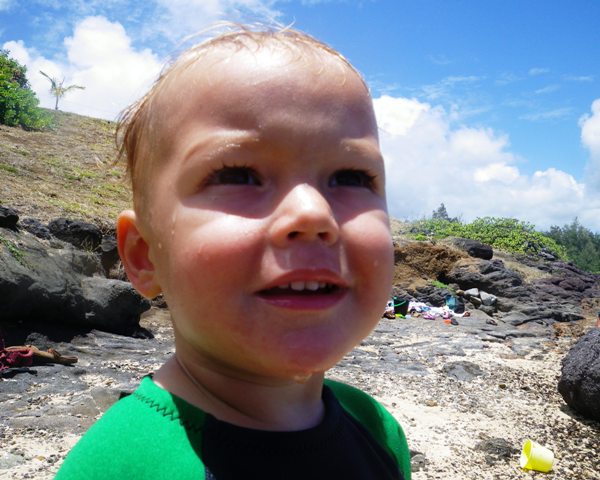wind tasting and the preschool paradox

- Ben and Sam at the tide pools after church today. A bit chilly for our very island-acclimated selves 🙂 Ben does well in this wetsuit Gramma got him for his birthday.
I wonder what a wind tasting would be like? This was a recent texting-typo, and I ended up liking it very much. It made me think of all the different hikes with different smells, how the ironwood needles smell earthy and piney on our fish-pond run or Mariner’s Ridge hike, how the eucalyptus is so pungent over at Ualaka’a, how a rain shower makes the air taste rich… The boys and I have really been hankering to travel for a while now, despite the 50,000 miles we logged last year. Those expeditions lasted us a couple months of quelled wanderlust, but we’ve been registered for a space-a trip for about 4 months now, hoping for a good opportunity to jet off. Certain circumstances have kept us on-island (Dave’s travel, aging doggie, my work, desire not to get caught on the mainland with no way back due to competing with other space-a travelers much higher on the list because the spouse is traveling with them, etc.). But we keep looking for a good opportunity and excuse 🙂
Richard Louv’s Last Child in the Woods is an excellent overview of how this generation’s children came to have “nature-deficit disorder” as Louv describes it. There are very logical reasons for this development, but there are also plenty of opportunities to actively combat it, and help other families take the leap to join you. Excellent and quick read (maybe two weeks of before-bed reading).Neufeld and Mate’s Hold On to Your Kids: Why Parents Need to Matter More Than Peers is written by a Canadian team – a clinical psychologist specializing in child development and his physician/author friend. Neufeld and Mate present a compelling treatise on how our peer-oriented culture fosters a wide range of social and developmental ills, from bullying to suicide and depression. Our society is obsessive about creating opportunities for our preschoolers to socialize – we’re all under this pressure to make sure our kids can get along, make friends and thusly do well in school, fit in, etc. But what does the evidence say? Is there another side to this coin. Indeed, there is. In fact, the largest study of children age preschool through kindergarten found that kids with the most experience in daycare/preschool also tended to exhibit more aggressive tendencies, problem behaviors, etc. Yes, high quality daycare and preschool can help kids from less engaged households fare better in school than their peers from similar households. Somehow this message gets distorted, though, such that we all feel compelled to put our kids in daycare or preschool to be sure they get every advantage in the world. I challenge every thinking parent to read both sides of the literature. This is one absolutely outstanding book: compassionate, contemporary and compelling.
Thanks for the book reviews. I’m gonna have to add those to my book list:) Which ever you decide Alli, It will be the best for Sammy! A parent’s love just enhances the school experiences. A mother’s teaching to a child and vice versa is also endless:) What a great career we signed up for huh! Aloha, ~gg